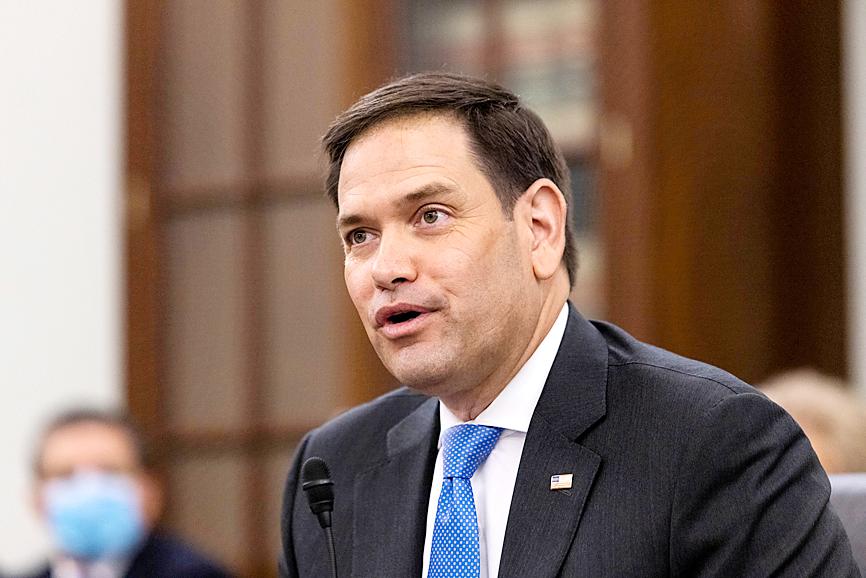Forty-two US senators across party lines have urged US Trade Representative Katherine Tai (戴琪) to lay the groundwork for negotiating a free-trade agreement (FTA) with Taiwan.
In a joint letter to Tai on the eve of the 11th Trade and Investment Framework Agreement (TIFA) trade talks between Taiwan and the US on Wednesday, the US senators highlighted the importance of such dialogue with Taiwan.
“We respectfully request that you prioritize these talks and take steps to begin laying the groundwork for negotiation of a free-trade agreement (FTA), or other preliminary agreement, with Taiwan,” read the letter, initiated by US senators Marco Rubio and Mark Warner.

Photo: Reuters
The letter — which Rubio posted on his Web site on Wednesday — said that beyond commerce and investment, trade talks with Taiwan are of “great strategic importance.”
“We can all be confident that an agreement negotiated with Taiwan could serve as a model for what a high-standard FTA should look like,” the senators wrote.
“It will facilitate free trade under fair conditions that allow American workers, producers and companies alike to flourish. Advanced economies such as Singapore and New Zealand have paved the way by signing their own FTAs with Taiwan,” they said.
“Maintaining US economic influence in the region and reducing Taiwan’s dependence on China is essential to ensuring that the region remains free and open,” they added.
Prominent US senators who signed the letter include Senate Minority Whip John Thune; Senate Committee on Commerce, Science and Transportation Ranking Member Roger Wicker; and Senate Armed Services Committee Ranking Member James Inhofe.
In October last year, 50 US senators wrote to then-US trade representative Robert Lighthizer to urge the deepening of bilateral trade ties, Ministry of Foreign Affairs spokeswoman Joanne Ou (歐江安) said in a statement yesterday, thanking the 42 senators in the new congress for also supporting the improvement of Taiwan-US trade ties.
US Senator Chris Coons, who visited Taiwan last month, was also among the people who signed the letter, Ou added.
Wednesday’s virtual TIFA meeting was fruitful and marked a major milestone in Taiwan-US trade relations, she said.
Given the US’ bipartisan support for Taiwan, the ministry would continue to work with domestic government agencies to deepen Taiwan-US trade ties, Ou said.

MAKING WAVES: China’s maritime militia could become a nontraditional threat in war, clogging up shipping lanes to prevent US or Japanese intervention, a report said About 1,900 Chinese ships flying flags of convenience and fishing vessels that participated in China’s military exercises around Taiwan last month and in January have been listed for monitoring, Coast Guard Administration (CGA) Deputy Director-General Hsieh Ching-chin (謝慶欽) said yesterday. Following amendments to the Commercial Port Act (商港法) and the Law of Ships (船舶法) last month, the CGA can designate possible berthing areas or deny ports of call for vessels suspected of loitering around areas where undersea cables can be accessed, Oceans Affairs Council Minister Kuan Bi-ling (管碧玲) said. The list of suspected ships, originally 300, had risen to about 1,900 as

Japan’s strategic alliance with the US would collapse if Tokyo were to turn away from a conflict in Taiwan, Japanese Prime Minister Sanae Takaichi said yesterday, but distanced herself from previous comments that suggested a possible military response in such an event. Takaichi expressed her latest views on a nationally broadcast TV program late on Monday, where an opposition party leader criticized her for igniting tensions with China with the earlier remarks. Ties between Japan and China have sunk to the worst level in years after Takaichi said in November that a hypothetical Chinese attack on Taiwan could bring about a Japanese

Right-wing political scientist Laura Fernandez on Sunday won Costa Rica’s presidential election by a landslide, after promising to crack down on rising violence linked to the cocaine trade. Fernandez’s nearest rival, economist Alvaro Ramos, conceded defeat as results showed the ruling party far exceeding the threshold of 40 percent needed to avoid a runoff. With 94 percent of polling stations counted, the political heir of outgoing Costa Rican President Rodrigo Chaves had captured 48.3 percent of the vote compared with Ramos’ 33.4 percent, the Supreme Electoral Tribunal said. As soon as the first results were announced, members of Fernandez’s Sovereign People’s Party

MORE RESPONSIBILITY: Draftees would be expected to fight alongside professional soldiers, likely requiring the transformation of some training brigades into combat units The armed forces are to start incorporating new conscripts into combined arms brigades this year to enhance combat readiness, the Executive Yuan’s latest policy report said. The new policy would affect Taiwanese men entering the military for their compulsory service, which was extended to one year under reforms by then-president Tsai Ing-wen (蔡英文) in 2022. The conscripts would be trained to operate machine guns, uncrewed aerial vehicles, anti-tank guided missile launchers and Stinger air defense systems, the report said, adding that the basic training would be lengthened to eight weeks. After basic training, conscripts would be sorted into infantry battalions that would take